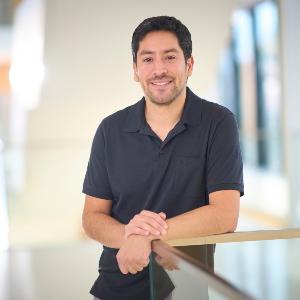Molecular Biology: New ERC Grant at LMU
5 Sept 2023
Young researcher Rodrigo Villaseñor has secured a Starting Grant from the European Research Council (ERC) with LMU – one of the most prestigious research grants in Europe.
5 Sept 2023
Young researcher Rodrigo Villaseñor has secured a Starting Grant from the European Research Council (ERC) with LMU – one of the most prestigious research grants in Europe.
Dr. Rodrigo Villaseñor, a junior researcher at LMU's Biomedical Center, has secured a Starting Grant from the European Research Council (ERC) for his research. The molecular biologist is head of an Emmy Noether Group funded by the German Research Foundation (DFG). Now he will receive project funding of 1.5 million euros. ERC grants are awarded on the basis of the scientific excellence of the applicant and the proposed project and are among the most prestigious research grants in Europe.

Dr. Rodrigo Villaseñor is a junior researcher at LMU's Biomedical Center | © Jan Greune
Early cancer detection could increase curative treatment and long-term survival. With his ERC project EpiCblood („Towards early cancer detection and tumor classification using epigenomic biomarkers in blood“) Rodrigo Villaseñor will improve a promising approach: Dying cells release small DNA fragments wrapped around a core of histone proteins into the bloodstream, so-called circulating cell-free nucleosomes (cf-nucleosomes). They carry DNA sequence information and histone modifications stable in blood, reflecting promising epigenomic disease biomarkers. But, the low proportion of cf-nucleosomes originating from cancerous cells versus the large background of nucleosomes arising from dying blood cells poses significant challenges for early cancer detection using circulating cf-nucleosomes.
In EpiCblood, Villaseñor will tackle these challenges and propose two complementary strategies to increase the number of “cancer-signature” cf-nucleosomes for cancer detection and tumor classification. In the first strategy, he will employ his previously developed synthetic histone modification readers to profile abundant histone modifications on cf-nucleosomes allowing him to seize up to 35 percent of the human genome noninvasively. Furthermore, he hypothesizes that tumorigenesis gives rise to cancer-specific genomic sites decorated with combinatorial histone marks, so-called “bivalent” regions, found explicitly in cancer and not in healthy adult cell types.
In the second strategy, Villaseñor will employ a computational pipeline to map cancer-specific bivalent sites across multiple cancer genomes. He will use his histone mark readers to test their diagnostic potential as cancer-specific biomarkers in blood plasma from healthy donors and cancer patients. He hopes that EpiCblood will be a major step towards developing precise and rich liquid biopsy assays for multiple clinical applications in cancer management.